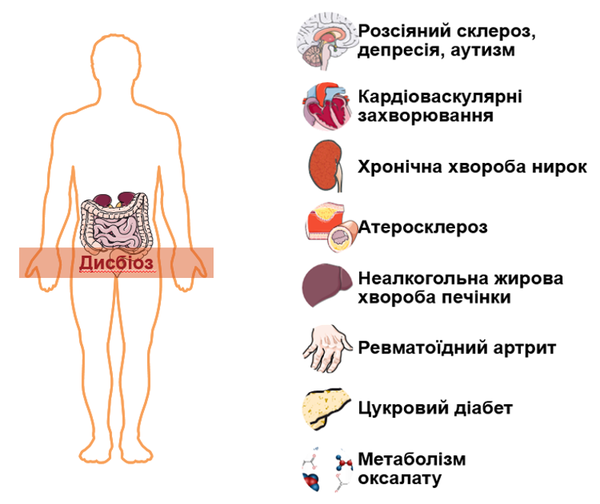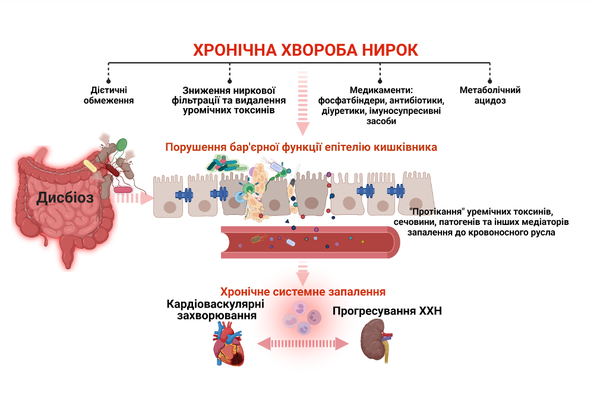Dialysis and intestinal health

The health of a patient on dialysis begins with the gastrointestinal tract!
The modern "boom" of scientific research is again focused on the health of the digestive system. Scientists argue that improving the condition of the gastrointestinal tract, namely the quantitative and qualitative composition of the microbiota, improves the overall condition and reduces the clinical manifestations of other diseases in patients on dialysis.
Glossary of terms:
Microbiota: a society of microorganisms containing bacteria, archaea, eukaryotes and viruses.
Microbiome: a set of microorganisms, including their genes, functional gene products and metabolites in a given biome, at a given time. The term "microbiome" was first introduced in 2001 to refer to the genetic material (DNA) of a microbiota (aggregate microbiota).
Dysbiosis: an unbalanced microbial community characterized by quantitative and qualitative changes in the composition of the microflora [1].
Intestine: an independent organ or another system of life?
Some interesting facts:
- More than 100 trillion bacteria - more than 500 species (more than 70 divisions) have been identified in the human body
- The biomass of microbes inhabiting the intestines of an adult is 1.5-3 kg, of which 1 g of endotoxins
- Only 10% of the cells that are part of the body are their own human cells, the remaining 90% - belong to bacteria that inhabit various human habitats (10: 1)
- 70% of bacteria live in the intestines, they feed on 20% of nutrients that come with food and 10% of energy
- The total genome of the intestinal microbiota outweighs the human genome by more than 150 times
- Human gastrointestinal bacteria can be laid around the Earth 2.5 times
The intestinal microbiota is recognized as an important component of human health and an influential factor in the development and progression of many diseases, including chronic kidney disease:

Patients with renal insufficiency are prone to malnutrition and energy deficiency due to dietary restrictions. In addition, excessive amounts of uremic toxins, medication (phosphate binders, antibiotics, diuretics, etc.) and dialysis modality significantly reduce the diversity of the intestinal microbiota and its amount, causing dysbiosis. In turn, intestinal dysbiosis further enhances the production of uremic substances and their precursors and reduces the barrier function of the intestinal epithelium [6, 7]. It should be noted that substances with toxic properties are physiologically formed in the intestine, but due to the barrier (protective) function of the epithelium, does not allow them into the bloodstream, excreted in the feces. In patients with chronic kidney disease, dysbiosis leads to disruption of the barrier function of the intestinal epithelium, the so-called leaky gut syndrome and the "leakage" of uremic toxins and pathogens into blood vessels, the development of chronic inflammation, progression of chronic kidney disease and heart disease. -vascular diseases (Fig. 1) [6, 7].

Fig. 1. The role of intestinal barrier dysfunction in the progression of chronic kidney disease and cardiovascular disease (Created on BioRender.com).
That is why the violation of the intestinal microbiota in patients with chronic kidney disease is associated with chronic inflammation, the development of cardiovascular disease and increased mortality. Determining the correct balance of the intestinal microbiome can significantly reduce the level of systemic inflammation and improve the health of the cardiovascular system. Scientists believe that manipulation of the intestinal microbiome can significantly change future approaches to medical care for patients with chronic kidney disease.
Previous studies have shown that the use of pre- and probiotics improves the health of the gastrointestinal tract of people with various diseases, including chronic kidney disease. In a new study published in the National Kidney Foundation's Kidney Diet, Martin del Campo and her team created a gel of probiotic bacteria (beneficial lacto- and bifidobacteria) and prebiotics (fiber) that a dialysis patient can consume directly from the package. , without additional water [8].
The results of the study showed an improvement in digestive symptoms in patients on dialysis. Other symptoms included decreased vomiting, heartburn, abdominal pain, and constipation. It has also been found that probiotic gel improves the body's ability to absorb nutrients and reduces inflammation [8].
We advise patients to consult their nephrologist about the possible use of pre- and probiotics.



